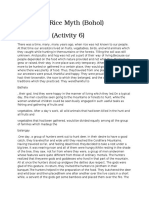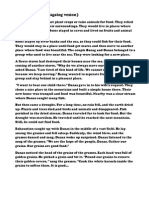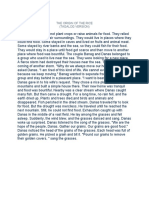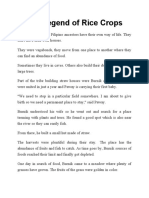The Rice Myth
The Rice Myth
Uploaded by
Shie La Santillan MedezCopyright:
Available Formats
The Rice Myth
The Rice Myth
Uploaded by
Shie La Santillan MedezOriginal Title
Copyright
Available Formats
Share this document
Did you find this document useful?
Is this content inappropriate?
Copyright:
Available Formats
The Rice Myth
The Rice Myth
Uploaded by
Shie La Santillan MedezCopyright:
Available Formats
The Rice Myth (Bohol Version)
There was a time, many, many years ago, when rice was not known to our people. At that time
our ancestors lived on fruits, vegetables, birds, and wild animals which they caught while hunting in the
mountains or the forests. Tilling the soil was still unknown. And poultry and hog was not yet a part of
their way of living. Because our people depended on the food which nature provided and not what they
themselves grew or raised, their stay in one place was only temporary. When there was nothing more to
be hunted or gathered in a certain place, they would go to another region where there was plenty of
food. Thus, they travelled from one place to another. But our ancestors were proud, thankful and
happy. They were proud of the things they had- their brown skin, the race to which they belonged, and
the customs and traditions which they practiced. They were thankful to
Bathala, their god. And they were happy in the manner of living which they led. On a typical day, the
men could be seen going to the mountains or forests to hunt, while the women and small children could
be seen busily engaged in such useful tasks as fishing and gathering of fruits and
vegetables. After a day’s work, all wild animals that had been killed in the hunt and all fruits and
vegetables that had been gathered, would be divided equally among all the group of families which
made up the balangay .
One day, a group of hunters went out to hunt deer. In their desire to have a good catch, they traveled
far and wide until they reached the Cordillera Mountains. Having traveled so far, and feeling dead tired,
they decided to take a rest under a big tree. It was nearing noon and all of them were hungry. While
resting in the shade of the tree, they saw, not far from where they were, a group of men and women
whose features were quite different from those of ordinary mortals. The hunters realized that they were
gods and goddesses who lived in that part of the mountain. All at once the hunters stood up and gave
the deities due respect. The gods were glad of this gesture. In return, they invited the hunters to join
them in their banquet. The hunters helped in the preparation of the food. They butchered the deer and
wild boar and then placed them one after another over the live coals. In a short while, a servant of the
gods got some bamboos and placed them over the fire. The bamboos contained small, white kernels
shaped like beads. Soon after, the cooked kernels were placed in saucer-shaped banana leaves. The
table laden with roasted meat, cooked vegetables, and fresh fruits. Other bamboos were brought in and
these contained what looked like pure water. The hunters soon learned that the crystal-like substance
was not water but rather, the wine of the gods. At first, the hunters were reluctant in joining the feasts
–after seeing the small, white kernels. “We do not eat worms,” the chief hunter said.
The gods smiled. “These white bead-shaped kernels are not worms,” replied one of the gods. “They are
cooked rice. They come from a certain kind of plant which we ourselves grow. Come and feast with us.
After we have eaten, kill us if you find anything wrong from eating rice.”
After hearing the god’s words, the hunters did not argue anymore. They feasted with the gods. They
were satisfied and happy, not because they were fed but because of the energy they felt after eating
cooked rice. Their weak bodies became strong. After the feast, the hunters thanked the gods.
You might also like
- Distinguishing Features of Notable Anglo-American Lyric Poetry, Songs, Poems, Sermons, and AllegoriesDocument10 pagesDistinguishing Features of Notable Anglo-American Lyric Poetry, Songs, Poems, Sermons, and AllegoriesShie La Santillan Medez63% (8)
- Colores PDFDocument10 pagesColores PDFDiego Solano100% (1)
- Report On The Life of AdivasisDocument8 pagesReport On The Life of AdivasisDrashti Jahnavi Thakkar100% (1)
- The Rice Myth (Bohol Version)Document1 pageThe Rice Myth (Bohol Version)Shie La Santillan MedezNo ratings yet
- The Rice MythDocument2 pagesThe Rice MythJasmine ProjasNo ratings yet
- The Rice Myth (Bohol) (Activity 6)Document2 pagesThe Rice Myth (Bohol) (Activity 6)Jasmine ProjasNo ratings yet
- The Story of Rice MythDocument2 pagesThe Story of Rice MythMarie ChaseNo ratings yet
- The Origin of RiceDocument2 pagesThe Origin of RiceLiesl Erica Santos ChanNo ratings yet
- Rice MythDocument2 pagesRice MythCrisbern Gozun83% (12)
- The Origin of RiceDocument2 pagesThe Origin of Ricebeloved120593% (14)
- The Rice Myth Bohol VersionDocument2 pagesThe Rice Myth Bohol Version여자마비No ratings yet
- The Rice MythDocument3 pagesThe Rice MythMica Cecille Marquez100% (4)
- Bohol Rice MythDocument2 pagesBohol Rice MythMarlyn Laurio-patriarca56% (16)
- The Origin of RiceDocument7 pagesThe Origin of RiceFaith CafeNo ratings yet
- The Rice MythDocument3 pagesThe Rice MythRigorMortizNo ratings yet
- The Origin of Rice (Philippine Legend)Document2 pagesThe Origin of Rice (Philippine Legend)LoUie A. AquiNo ratings yet
- The Origin of Rice (Tagalog Version)Document2 pagesThe Origin of Rice (Tagalog Version)Je Ru SelNo ratings yet
- The Origin of Rice Beloved1205Document4 pagesThe Origin of Rice Beloved1205Phoebe Tan100% (2)
- The Rice MythDocument4 pagesThe Rice MythRjvm Net Ca Fe89% (9)
- The Rice Myth-Bohol Version Sappia The GoddessDocument3 pagesThe Rice Myth-Bohol Version Sappia The GoddessHerleiy Jyne SmithNo ratings yet
- Page73 76Document4 pagesPage73 76rayufu4No ratings yet
- Reading Module For High SchoolDocument8 pagesReading Module For High SchoolDessa Luna MacaraigNo ratings yet
- The Origin of Rice (Tagalog)Document3 pagesThe Origin of Rice (Tagalog)Shen Ivy M. HampacNo ratings yet
- The Origin of Rice - TagalogDocument2 pagesThe Origin of Rice - TagalogDon100% (3)
- The Origin of The RiceDocument1 pageThe Origin of The Ricecheryl7kathrine7b.7aNo ratings yet
- History Grade 5Document16 pagesHistory Grade 5Musa MNo ratings yet
- Alamat NG PalayDocument1 pageAlamat NG PalayJhon Marco MandalNo ratings yet
- Tribal Groups in Northeast India FINALDocument10 pagesTribal Groups in Northeast India FINALSurfer 2.0No ratings yet
- IJRPR9535Document8 pagesIJRPR9535raajeshandaiNo ratings yet
- The Vision of The SagesDocument7 pagesThe Vision of The SageskvsramanNo ratings yet
- Being a Vegetarian by Choice: A Natural, Healthier AlternativeFrom EverandBeing a Vegetarian by Choice: A Natural, Healthier AlternativeNo ratings yet
- Tribals of IndiaDocument14 pagesTribals of India123456sntshNo ratings yet
- From Hunting Gathering To Growing FoodDocument16 pagesFrom Hunting Gathering To Growing FoodKritikaNo ratings yet
- Gondsdocumentary 160901081853Document20 pagesGondsdocumentary 160901081853kuldeepNo ratings yet
- Eastern Woodlands PeopleDocument8 pagesEastern Woodlands Peopleapi-505253689No ratings yet
- The Legend of Rice CropsDocument2 pagesThe Legend of Rice CropsBryantNo ratings yet
- Folklore and Biodiversity ConservationDocument13 pagesFolklore and Biodiversity ConservationventurousytNo ratings yet
- Native Americans: Native Americans Were The People Who Lived in America Before People From Other Countries Came HereDocument24 pagesNative Americans: Native Americans Were The People Who Lived in America Before People From Other Countries Came HereMackenzie ConradNo ratings yet
- Bhills: Origin/HistoryDocument2 pagesBhills: Origin/HistoryChetasi KothiwalaNo ratings yet
- Trekking To Hot Water Springs at BeamaDocument4 pagesTrekking To Hot Water Springs at BeamaNoyonika BanerjeeNo ratings yet
- Socio Economic Condition of Rural AssamDocument6 pagesSocio Economic Condition of Rural Assamjai gopalNo ratings yet
- Indegnious People of The World The Koya: RestdDocument9 pagesIndegnious People of The World The Koya: RestdZeeshan795No ratings yet
- Gond Tribe Lifestyle Food Culture Madhya Pradesh Without ImageDocument2 pagesGond Tribe Lifestyle Food Culture Madhya Pradesh Without ImageAbhijith ANo ratings yet
- Bishoni Thar DesertDocument22 pagesBishoni Thar Desertaakash purohitNo ratings yet
- Huntersngatherers 160829100816Document44 pagesHuntersngatherers 160829100816Neema RelucioNo ratings yet
- Rich Text Editor FileDocument4 pagesRich Text Editor FiledipanjancalcuttaNo ratings yet
- Grade 5 History Term 1 NotesDocument3 pagesGrade 5 History Term 1 NotespavithranaidooNo ratings yet
- Eng AIPDocument3 pagesEng AIPnaisha patelNo ratings yet
- The TainoDocument6 pagesThe TainoTyhishia ClarkeNo ratings yet
- Ikalahan People in The PhilippinesDocument15 pagesIkalahan People in The PhilippinesLhiezle Balangatan100% (2)
- 2nd Aralin 2 7Document10 pages2nd Aralin 2 7Elma RobinNo ratings yet
- From Gathering To Growing Food: Neinuo's LunchDocument10 pagesFrom Gathering To Growing Food: Neinuo's Lunchsoumya KavdiaNo ratings yet
- Kothari MedicinemenDocument27 pagesKothari MedicinemenChitranshu KumarNo ratings yet
- Lecture Notes On Buhid Mangyan BeliefsDocument4 pagesLecture Notes On Buhid Mangyan BeliefsLeslie MacujaNo ratings yet
- Wiradjuri Book PDFDocument47 pagesWiradjuri Book PDFBeecroft Philip AdamNo ratings yet
- Project SocialDocument13 pagesProject SocialT VEDA VIKRANTHNo ratings yet
- Module 2 Lesson 2 - The Subanun Tribe-1Document41 pagesModule 2 Lesson 2 - The Subanun Tribe-1MILDRED LLARENASNo ratings yet
- The Natural Wonders of India, Being A Food Detective, Part 2Document9 pagesThe Natural Wonders of India, Being A Food Detective, Part 2press.club.indya.1000No ratings yet
- The Hand of The BlacksDocument1 pageThe Hand of The BlacksShie La Santillan MedezNo ratings yet
- WASHINGTON, DC - JANUARY 04: U.S. House Majority Leader Rep. Eric Cantor (R-VA) (C) Walks Towards The HouseDocument6 pagesWASHINGTON, DC - JANUARY 04: U.S. House Majority Leader Rep. Eric Cantor (R-VA) (C) Walks Towards The HouseShie La Santillan MedezNo ratings yet
- Hero Song Lyrics Visual AidDocument1 pageHero Song Lyrics Visual AidShie La Santillan MedezNo ratings yet
- Homonyms, Homophones, Homographs, and Heteronyms: HOMONYMS Are Words That Sound Alike But Have DifferentDocument2 pagesHomonyms, Homophones, Homographs, and Heteronyms: HOMONYMS Are Words That Sound Alike But Have DifferentShie La Santillan MedezNo ratings yet
- Noun PhraseDocument2 pagesNoun PhraseShie La Santillan MedezNo ratings yet
- Figures of Speech QuizDocument2 pagesFigures of Speech QuizShie La Santillan Medez0% (1)
- Find All of The Sequencers in The Following SentencesDocument1 pageFind All of The Sequencers in The Following SentencesShie La Santillan MedezNo ratings yet
- GX600 (MS-163A) Part NumberDocument30 pagesGX600 (MS-163A) Part Numberwirelesssoul100% (1)
- Catalogo ProMusic 2015Document182 pagesCatalogo ProMusic 2015ale_rosi74No ratings yet
- McKee Chapter8 Sample PDFDocument44 pagesMcKee Chapter8 Sample PDFMustafa Kırca100% (1)
- HP LaserJet Pro M1217nfwDocument2 pagesHP LaserJet Pro M1217nfwAlejandra SanchezNo ratings yet
- Gobbo Hole 01 DungeonDocument2 pagesGobbo Hole 01 Dungeontylerstanley225No ratings yet
- Week 6B - IsomerismDocument4 pagesWeek 6B - IsomerismMaxNo ratings yet
- Boehmer FSK V DN32-200 PN10-40 EN PDFDocument1 pageBoehmer FSK V DN32-200 PN10-40 EN PDFabdelkader benabdallahNo ratings yet
- UNIVERSAL MORAL LESSONS by Swami SivanandaDocument164 pagesUNIVERSAL MORAL LESSONS by Swami SivanandakartikscribdNo ratings yet
- 2.50 Hours 9 DaysDocument10 pages2.50 Hours 9 DaysChristopher Lennon Dela CruzNo ratings yet
- Reiki Iyashino TeDocument151 pagesReiki Iyashino TePippo Baudo100% (1)
- Sany SR 185 Rotary Drilling RigDocument8 pagesSany SR 185 Rotary Drilling RigMoto heavenNo ratings yet
- Grade 7Document1 pageGrade 7طاہر شاہNo ratings yet
- Basics of Hydrauluic SystemDocument47 pagesBasics of Hydrauluic SystemHarish GouthamNo ratings yet
- Actix Cell File Creation HelpDocument11 pagesActix Cell File Creation Helplokesh guptaNo ratings yet
- Networking Reference GuideDocument564 pagesNetworking Reference GuideJuan EspinozaNo ratings yet
- Design and Development of Convolutional Neural Network For Early Tumor Detection in BrainDocument49 pagesDesign and Development of Convolutional Neural Network For Early Tumor Detection in BrainInjamul HaqueNo ratings yet
- East Halmahera Ferronickel Plant Development Project Proyek Pengembangan Pabrik Ferronickel Halmahera Timur Document Numbering SystemDocument2 pagesEast Halmahera Ferronickel Plant Development Project Proyek Pengembangan Pabrik Ferronickel Halmahera Timur Document Numbering SystemCoco RhomoNo ratings yet
- NEC Level 1 Training PresentationDocument66 pagesNEC Level 1 Training Presentationnikhom_dk1565No ratings yet
- Model ZW209: Pressure Reducing ValveDocument4 pagesModel ZW209: Pressure Reducing ValveHai PhanNo ratings yet
- Charles Babbage BiographyDocument2 pagesCharles Babbage BiographyhfNo ratings yet
- Delivery Nursing Care PlanDocument6 pagesDelivery Nursing Care PlanKayelyn-Rose CombateNo ratings yet
- Polymers - 20Document60 pagesPolymers - 20MnkNo ratings yet
- Chain Washing System Mod.635 18/16 ALUPRESSDocument88 pagesChain Washing System Mod.635 18/16 ALUPRESSAlamin SiddiqueNo ratings yet
- Glosario Ingles I / Lengua I: Ingles: Tema 1: Saludos, Despedidas Y PresentacionesDocument6 pagesGlosario Ingles I / Lengua I: Ingles: Tema 1: Saludos, Despedidas Y PresentacionesMarisol Vera Contreras0% (1)
- Natural History 200112 Un SeDocument830 pagesNatural History 200112 Un Seacademo misirNo ratings yet
- Directory IeeeDocument16 pagesDirectory Ieeebiviana81No ratings yet
- Chemistry Virtual Lab #1 (Separation Techniques)Document5 pagesChemistry Virtual Lab #1 (Separation Techniques)yash patelNo ratings yet
- PAF Test Material and Guidelines by Issb MaterialsDocument9 pagesPAF Test Material and Guidelines by Issb MaterialsArhamNo ratings yet
- Vespa G.S. Mod 61 - 64Document54 pagesVespa G.S. Mod 61 - 64anon_981430429No ratings yet

































































































